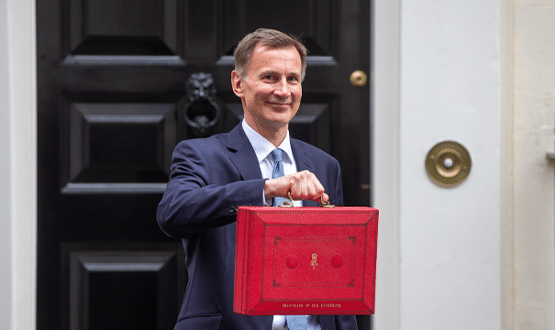Hunt: IT funds will support ‘Ivy league’ of exemplar trusts
- 7 September 2016

In response to the Wachter review of NHS IT, health secretary Jeremy Hunt has announced there will be two waves of 'global' and 'national' digital exemplar trusts, forming an 'Ivy league' of digital excellence.
However, this could mean that half of all the trusts in the NHS could miss out on central funding ahead of the 2020 'paperless' target, which now seems to have been pushed out to 2023 to accommodate them.
At the Health and Social Care Expo in Manchester, Hunt gave an enthusiastic reception to Dr Robert Wachter long awaited review on the digital future of NHS IT, which was released overnight. Crucially, he backed its recommendation that central funding should be released in waves, with more digitally advanced trusts benefiting first.
NHS England released a list of twelve ‘global digital centres of excellence’ or ‘exemplars’ alongside the report. These will receive around £10 million from a £100 million pot that they will be expected to match locally. Another wave of just 20 'national centres of excellence' will follow, and receive around £5 million.
In his speech, Hunt said that trusts could rise or fall to become or lose 'global exemplar' status, depending on their digital performance every year; likening the arrangement to football league relegation and promotion.
"The first thing we need to do is have a group of hospitals that, by the end of this parliament, really do become world class… an Ivy league of hospitals," he said.
Earlier, Wachter told the Expo the review had divided the NHS trusts into three categories of digital maturity.
‘Group A’ are the “digital strong”, which include the exemplars: Wirral University Teaching Hospital, University Hospitals Birmingham, City Hospitals Sunderland, West Suffolk, Royal Free London, Oxford University Hospitals, Taunton and Somerset, University Hospitals Bristol, University Hospitals Southampton NHS foundation trusts, and Royal Liverpool and Broadgreen University Hospitals, Salford Royal Hospitals, Luton and Dunstable University Hospital NHS trusts.
Funding for these trusts should be prioritised to transform them from digitally advanced trusts to global leaders, Wachter said, adding that this could mean them forming relationships with international organisations and leading digital innovation in the NHS.
“We need to balance equity with excellence,” Wachter told the Expo. “Of course, on one level we’d love to give the money to every trust in the country but there are also trust at very different stages…
“It’s also important to identify trusts that are already pretty good and with some resources could be made really really excellent. And we felt that was a reasonable thing to do.”
The second group, ‘Group B’, are less advanced but “digitally fair” and could become digitally mature by 2020. Wachter suggested they should act as national and regional exemplars to less advanced trusts, partner with group A trusts to share knowledge, and facilitate interoperability within their region.
“This a group that doesn’t aspire to international prominence but aspires to digital excellence in their environment.”
The government has said there will be asecond round of selection for 20 ‘national’ centres for digital excellence, which Hunt confirmed would be part of group B.
These trusts will be given up to £5 million each, half the cash destined for individual ‘global’ centres; but it is unclear whether this funding will be additional to £100 million already announced.
The third group, a ‘Group C’, covers about half of all NHS trusts. Wachter said they should not receive central funding until after 2020, as they were not yet digital advanced enough to use the money effectively.
“Group C that is not ready for a major digitilisation effort, and if you throw money at them there is a decent chance you will be wasting it, and you will get it wrong. We thought it was important to delay implementation in that group,” he told the Expo.
Instead this group should be given time to get their culture right for IT changes and “till the soil”, he said. The government should then commit to a further tranche of central funding for this group between 2020 and 2023 for digital transformation, once they have their IT houses in order.
The government has yet to commit to any further funding beyond the end of the current Parliament, in 2020. The Treasury agreed a funding settlement with the NHS last October that included money for IT.
Health secretary Jeremy Hunt announced this spring that £4.2 billion would be spent on IT over the next five years, with around £1.8 billion of this earmarked for the ‘paperless’ agenda. Of this, £500 million is already committed to tying off the National Programme for IT.
However, Wachter said the free money committed so far would not be enough for NHS-wide digital transformation. In any event, the ‘Paperless 2020’ vision was unrealistic, Wachter said, and should instead by broken into two phases. Phase one would cover half of the trusts, groups A and B, and would run to 2020, while phase two would cover the other half, group C, and run to 2023.
Responding to the review, Hunt did not commit to any further funding or concede that the 2020 goal had been scrapped. He did agree that hospitals needed to move at different speeds and did refer to bringing all hospitals up to digital standard by 2023, not 2020.
"A hospital in special measure that have severe problems… may not be ready to invest in a hig IT transformation programme and e need to recognise that," he said.
If the government does adopt Wachter’s recommendations in full it is likely to exacerbate already simmering tensions about the have and have-nots in a scramble for a limited pool of central funding for digital transformation.
When the global centres for digital excellence were announced in August, some Digital Health News readers responded negatively, believing it would leave many trusts further and further behind.
Read more: about this morning's announcements at the Health and Social Care Innovation Expo in our earlier news stories about the Wachter review and NHS England's digital developments. There's more reaction to the exemplars programme in our feature; and there is coverage of the Wachter review's boost for CCIOs and clinical leaders in our feature by Jon Hoeksma.




